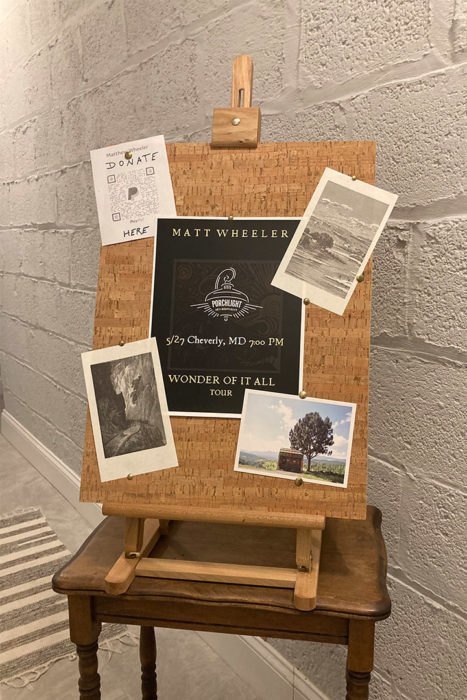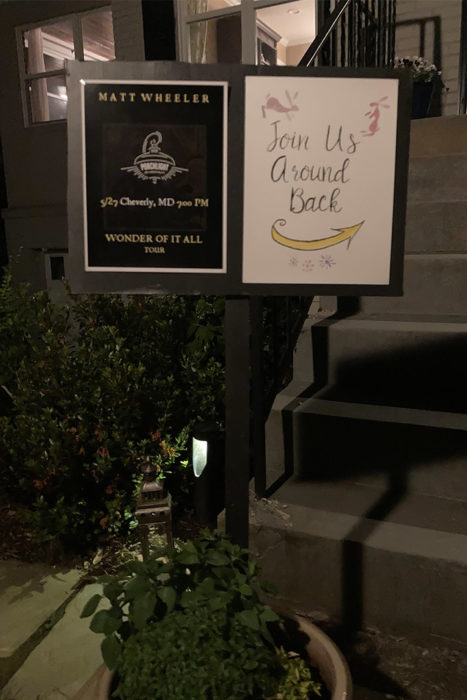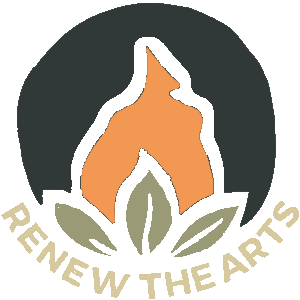There’s a method to the madness of opening up one’s home for live music. For some, this may look like choosing lights that lend a certain ambiance to the room. Others might invite a friend with a similar music vibe to open for the visiting artist. All of this exhibits your particular art of hospitality—as significant as the art it frames and sustains.
Whatever elements we decide, the choices we make in that process inevitably spring from a root of belief, of meaning. Orthopraxy follows orthodoxy. In other words, our faith feeds all of our work.
So what does it mean to have a theology of hospitality? Where can it take us? We caught up with Porchlight host Austin Smith from Washington D.C. the other day to pick his brain on the matter.

Q: You’re about to host your second Porchlight show with Matt Wheeler, yes? Can you tell me a bit about the first one?
AS: This was a big new thing for our family to do. When Justus pitched the Porchlight idea, we were excited but were also like, “I don’t know if we are gonna fit with this or not.” But Justus was awesome and talked us through it. We live in a smallish house outside D.C. where everything is small, so that was one concern. I wasn’t sure it was going to work because in my mind I could only see people in barns and massive fields, places like that.
We set up a food table with food that we thought fit with Matt Wheeler’s music and vibe, Americana stuff like homemade bread, cookies, tea, and beer, that sort of stuff. Then we turned our patio into his stage and set up chairs around it. We had a good mix, probably 50/50 between friends from church and friends from around town. Matt blends his music and storytelling. He’s very conversational, has stories to share, and music to go with it. People loved it and came back for more.
One of the things my wife and I are very excited about with the Porchlight opportunity is making some of those connections. We’ve been trying to find ways to reach across and connect folks, and also just put faces and warmth to names. Our town went through a pretty disruptive election season, so we saw this as a way to serve our community and pull people together.
Q: It seems like you have a strong interest in the theology/philosophy behind the art of hospitality. Do you mind unpacking your understanding of hospitality?
AS: I’d love to talk about it. My wife and I lived for three years in Germany with the U.S. military community. During that time, one of the things that started to develop in our thinking and our engagement with our neighbors, church, and community, was seeing a lot of disconnection between people and wanting to draw them together.
We started reading a lot of books focused on Christian hospitality and intentional communities such as L’Arche or L’Abri, but also stuff by Christine Pohl and other Christian thinkers. They don’t look so much at things like backyard get-togethers, but one of the things we took away from our reading was seeing how hospitality is used in America to describe entertainment. [It’s described] like having a home for entertaining or putting on a show, putting on your makeup, and entertaining people, versus hospitality which included things like having hospitals in these Christian spaces historically. Instead of thinking of hospitality like, “Hey, how do we look good in a way that would make Martha Stewart pleased with us?” shifting to “What are the needs that we can meet as Christians and what might God be calling us to do?”
One of the things that we’ve noticed in hospitality is there’s a lot of risk involved, both to the host and to the guest. When you’re bringing people into a home where you don’t really know them and they don’t know you, there’s a lot of opportunities for misunderstanding and not meeting expectations. Having something like “Hey, this is something artistic and musical and it’s a gift” has paved some space for us to bring people into our lives that might otherwise feel uncomfortable doing so.
We’re inundated with music. You can get it on your smartphone, or wherever, whenever you want, to the point where we don’t really think about what goes into creating it and the human beings involved. It’s just so easy to turn it on, turn it off, tune it out.
Having a musician in our home allows us to say “This is a gift. I know you guys can turn on your radio and get music whenever, but this is a bit different. This is a person with a story and life.” That’s why we’re really jazzed about Porchlight.
 Q: How have these ideas of intentional Christian living shaped your perspective on the arts?
Q: How have these ideas of intentional Christian living shaped your perspective on the arts?
AS: Another influence on my and my wife’s thinking has been the work of Ken Myers with Mars Hill Audio. He interviews a lot of different Christian thinkers, but he tends to explore what it means to be living in bodies in the world. What do we do with the fact that we’re limited, localized, and placed in bodies? Particularly in contrast to some of the pressures of our culture with tech, to think of ourselves as disembodied in certain ways, or imagine ourselves as though we were separated.
But there’s an embodiment to artistic activity and artifacts. Those things are created by individuals in time and space, and a lot of them have a temporary lifespan, particularly with music. The song’s over and it’s over. Even with visual art. Those things don’t last forever. So that has encouraged us to think about how we’re engaging with the world around us in the present moment, and considering the value of it for eternity.
What’s presented in beautiful and thoughtful artwork has eternal value to it and it’s able to do that in part because it’s embodied in moment, time, and place. There’s movement between what’s happening now and outside of time.
 Q: What are some practical ways in which your approach to hospitality has been formed by this philosophy?
Q: What are some practical ways in which your approach to hospitality has been formed by this philosophy?
AS: In Edith Schaeffer’s work Hidden Art, she talks about day-to-day aspects of life in a home that incorporate truth and beauty, such as flower arranging, painting, music, etc. Not recommending that any one person be able to do all those things, but finding one or two that are native to you and using those as a way to bless people who come through the door.
My wife is a fantastic home chef, so the food elements particularly are something that she loves to think about and try to offer something more than just filling bellies or providing snacks for chitchat. She’s done a lot in thinking through what we’ll serve and how to offer it in a way that communicates the home. Like homemade bread: you can smell that wafting from the oven, and you can pull it apart — y’know, tangible stuff.
That’s been a focus we try to communicate: “You’re not just coming to a concert that’s in our town versus somewhere else. You’re coming to a family and a community that already exists.” And inviting people to be part of it, to give people a few things they can grab onto to find a point of connection. Food seems to be a low-entry, easy-access thing.
 Q: What would you say to someone who’s just starting to get into these ideas?
Q: What would you say to someone who’s just starting to get into these ideas?
AS: I would say just go for it! Give it a try. If possible, try to do that without importing all of the expectations that Instagram and such put on people, as if this is what it means to be hospitable or have an event at your home.
Maybe reorient to the way Christ shows hospitality in the Gospels and to us through the Spirit. He’s in the flesh and He’s a servant, and He’s attentive to the needs of people He’s with and serves those.
So maybe thinking about hospitality more in those terms could invite a deeper engagement and take some of the pressure off of “Oh my gosh, my floors are so dirty,” or “I forgot to weed the flower beds.” I have those thoughts, too. If we don’t get to it, that’s okay, because if these other things are happening, that’s the priority.



